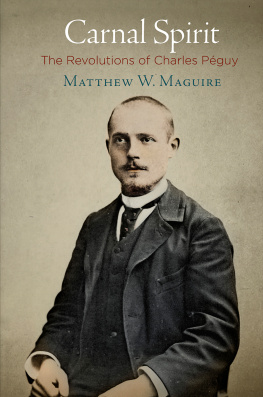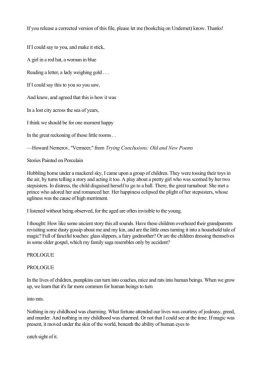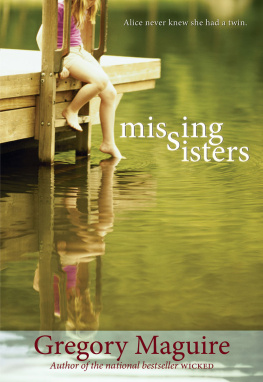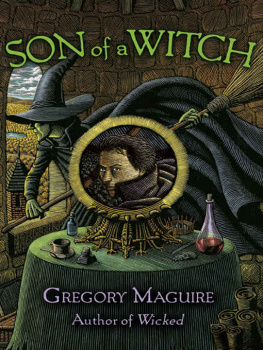Maguire Matthew W. - Carnal Spirit
Here you can read online Maguire Matthew W. - Carnal Spirit full text of the book (entire story) in english for free. Download pdf and epub, get meaning, cover and reviews about this ebook. year: 2019, publisher: University of Pennsylvania Press, genre: Romance novel. Description of the work, (preface) as well as reviews are available. Best literature library LitArk.com created for fans of good reading and offers a wide selection of genres:
Romance novel
Science fiction
Adventure
Detective
Science
History
Home and family
Prose
Art
Politics
Computer
Non-fiction
Religion
Business
Children
Humor
Choose a favorite category and find really read worthwhile books. Enjoy immersion in the world of imagination, feel the emotions of the characters or learn something new for yourself, make an fascinating discovery.
- Book:Carnal Spirit
- Author:
- Publisher:University of Pennsylvania Press
- Genre:
- Year:2019
- Rating:5 / 5
- Favourites:Add to favourites
- Your mark:
- 100
- 1
- 2
- 3
- 4
- 5
Carnal Spirit: summary, description and annotation
We offer to read an annotation, description, summary or preface (depends on what the author of the book "Carnal Spirit" wrote himself). If you haven't found the necessary information about the book — write in the comments, we will try to find it.
Carnal Spirit — read online for free the complete book (whole text) full work
Below is the text of the book, divided by pages. System saving the place of the last page read, allows you to conveniently read the book "Carnal Spirit" online for free, without having to search again every time where you left off. Put a bookmark, and you can go to the page where you finished reading at any time.
Font size:
Interval:
Bookmark:

CARNAL SPIRIT
CARNAL SPIRIT

The Revolutions of Charles Pguy
Matthew W. Maguire

UNIVERSITY OF PENNSYLVANIA PRESS
PHILADELPHIA
Copyright 2019 University of Pennsylvania Press
All rights reserved. Except for brief quotations used for purposes of review or scholarly citation, none of this book may be reproduced in any form by any means without written permission from the publisher.
Published by
University of Pennsylvania Press
Philadelphia, Pennsylvania 19104-4112
www.upenn.edu/pennpress
Printed in the United States of America on acid-free paper
1 3 5 7 9 10 8 6 4 2
A catalogue record for this book is available from the Library of Congress.
ISBN 978-0-8122-5095-4
CONTENTS

INTRODUCTION

Born into a provincial family of modest means, Charles Pguy became an internationally famous intellectual in the years before the Great War; he was killed in that war at the age of forty-one. As a poet, journalist, and philosopher, for generations his writing prompted fascination, awe, fury, scorn, searching criticism, laughter, wonder, little imitation, and no indifference.
Among Pguys most abiding enquiries was the question of what it means to be modern. We are often modern, thought Pguy, in two different ways. One way advances an inexorable becoming; another opposes it.
Credentialed, procedural, and managerial in affect, the advocates of a new, entirely immanent becoming, thought Pguy, work to transform institutions patiently from within rather than seeking their overthrow. Sustained in ways great and small by the ultimate assumptions and insatiable expansion of global marketswith the market and its technological artifices as the ubiquitous and paradigmatic form for all human relations with others and with the worldthis process brings the imperatives of negotiated, contractual exchange and profitable consumption to all our experiences, guided by the ongoing labor of sciences natural and social. Human being is increasingly encompassed by an ever more uncompromising immanence, from which the transcendent appears only through cracks in locked doors of long disuse, the unceasing glare within obscuring prospects without.
These advocates sense by no means an unreserved concord of discrete practices or ultimate purpose, but rather, a profound and ongoing alignment between their aspirations and the general direction of a society propelled forward by a technological market. Hence they express a deep if occasionally irritable confidence that their triumph is assured. While they work within free republics, they are not always or even often sympathetic to notions of individual free will, or sovereignty of the people; they wish supremely to see their shared idea of the future vindicated, which, they assume, will require the persistent and expansive guidance of accredited specialists in diverse fields of enquiry and policy.
The adherents of this way are generally sympathetic to determinism, in either material or social forms. As long as there is history, science and technology will always allow human beings to remake our world continuously (often in ever more complete accord with science itself). They assume the ultimate reality of an experimental becoming against the illusions of a persistent (or worse, eternal) being. They tend toward agnosticism or atheism, to the desirability of practical arrangements among persons and societies governed by continuous negotiations about contingent values that often cash out to some increasingly self-concious, increasingly pervasive validation of material and social interests, even if a diminution in communal meaning and purpose is the object of abstract speculation.
For most of their advocates, these assumptions should generally not be positively defended. Rhetorics of indirection, irony, and above all, applications of putatively dispassionate method are much to be preferred to making direct claims about the ultimate nature of reality that inevitably elicit pointless and tedious butannoyinglynot refuted counterargument. Direct disagreement with the supereminent assumptions underwriting their historical advance is hence embarrassing. Set directly before a person or persons who insist on such disagreement, it is generally best not to engage with them at all but to continue ones work with the like-minded, secure that ones own positions are and will be sustained by a deeper and inexorable logic working through political economy, culture, scholarship, technology, and institutions.
The specifically scholarly advocates of this immanence often complement the progress of technology and of the social sciences with a highly developed if selective historical consciousness. A methodical and comprehensive contextualization regularly falls with force upon philosophies of life and the world different from their own; the injustices that might or ought to be attributed to these views receive close attention, and the injustices that might or ought to be attributed to the scholars views are passed over in silence. It is assumedand thus unsurprisingly concludedthat alternative meanings and accounts of the whole ultimately owe their existence to atavism, and with it more intellectually limited, cruel, fearful, credulous, and scarcity-addled pasts, decisively produced by transitory and often unhappy circumstances, upon which the meticulous scholar can now perform distinctively modern disciplinary operations.
Whatever their walks of life, the advocates of this immanent, expansive becoming are at home in universities. Their sense of self is entwined with them, and the order of merit and prestige attending them. Befitting their professional status, an appropriate zeal for their own advancement and that of their allies is suitable, even praiseworthy. To pay dearly in order to live honestly in a flawed world is regrettably still necessary elsewhere; but through the expansion of perpetually negotiable becoming to which they have contributed as scholars and students, there is no longer a tension between being honored by ones contemporaries and telling the truth without reserve. To claim otherwise is to open the way for archaic economies of sacrifice, in which the desire to sacrifice for truth often produces the oppositions that themselves create the need for and legitimacy of sacrifice. It is thought better to examine that dangerous economy from a secure scholarly distance, or to avoid it entirely.
Among these judgments often rests the assumption that most of the longstanding particular forms of human conviction, belief, and allegiance that mediate between individual persons and universal humanityin particular, notions of communal continuity, of peoples, and perhaps above all of religious faithshould be allowed to dissolve inexorably, consumed by the irresistible velocity of media and scholarship, and the general liquefaction of identities in the flux of increasingly self-conscious becoming.
It is likely, and desirablea kind of immanent justicethat these older forms of being human will be altogether absorbed in that continuous, perpetually contemporary negotiation and exchange, issuing in a cumulative equanimity of perspective set loose from all particular fictions, all arbitrarily inherited and given commitments. For the daring, this will ultimately include the great given of being human. Human being may only be a transitional moment in becomings perpetual advance. Perhaps most important, a straightforwardly two-dimensional linear time, moving neatly from past to present to future, will vindicate this immanent and ultimately universal becoming.
Next pageFont size:
Interval:
Bookmark:
Similar books «Carnal Spirit»
Look at similar books to Carnal Spirit. We have selected literature similar in name and meaning in the hope of providing readers with more options to find new, interesting, not yet read works.
Discussion, reviews of the book Carnal Spirit and just readers' own opinions. Leave your comments, write what you think about the work, its meaning or the main characters. Specify what exactly you liked and what you didn't like, and why you think so.













